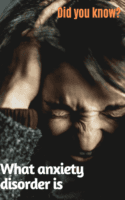The current situation our country is experiencing with the COVID-19 pandemic is anxiety inducing for many people. Not having control over the situation, being under lockdown, and living with the fear of contracting the virus has left many people feeling uneasy and unsettled. But sometimes these feelings are more than just nervousness. Anxiety is a real disorder and it affects millions of people around the world.
Anxiety disorder can be difficult to manage especially during this trying time. But what is it and how can you deal with it?
What is anxiety disorder?
The American Psychological Association (APA) defines anxiety as “an emotion characterized by feelings of tension, worried thoughts and physical changes like increased blood pressure.”
Anxiety in moderation is normal, it is your body’s natural response to stress. It is a fear about what’s to come. However, if feelings of anxiety are extreme and last for a protracted period, you may have an anxiety disorder.
If you have an anxiety disorder, you might experience this feeling of fear all the time. It can be debilitating and can stop you from living your life in a normal way, doing normal things like going to work, interacting with people or even leaving the house.
There are different types of anxiety disorders including:
• Generalised anxiety disorder (GAD)
• Social anxiety disorder
• Specific phobias
• Panic disorder
• Obsessive compulsive disorder (OCD)
• Post-traumatic stress disorder (PTSD)
In 2017, the Institute for Health Metrics and Evaluation (IHME) found that just under 300 million people worldwide suffered from an anxiety disorder. The World Health Organisation reports that along with depression, anxiety disorders are the most common mental disorders across the globe. This tells us that anxiety disorders are very real and it’s time to talk about them.
What are some of the symptoms of anxiety disorders?
You feel the palms of your hands getting sweaty. Your feel your heart pounding out of your chest. Your mind is running a mile a minute with negative thoughts about the future. You feel as though you are running out of time; you’re not going to make it. No matter how hard you try you can’t calm yourself down. Inside you’re screaming, and it is evident on your face. The smiles do not cover the worry in your eyes.
Many people experience anxiety in their daily lives but there is a difference between feeling momentarily anxious and having an anxiety disorder. Here are a few symptoms:
• Feeling nervous, restless or tense all the time
• Having a constant sense of impending danger, panic or doom
• Increased heart rate
• Breathing rapidly (hyperventilation)
• Increased or heavy sweating
• Trembling or muscle twitching
• Feeling weak or tired
• Trouble concentrating or thinking about anything other than the present
• Having trouble sleeping (insomnia)
• Panic attacks (which may happen intermittently)
It can often feel like there is no hope, but that is not the case. There are a many things you can do to help ease the effects of an anxiety disorder.
What to do if you have an anxiety disorder:
1. Start by taking deep breaths – taking a moment to close your eyes and do breathing exercises can help to calm you down and it will help you think calmly about the situation at hand.
2. Practise self-care – looking after yourself by getting enough sleep, exercising and having a daily routine can go a long way to easing anxious feelings.
3. Eat healthily – research shows that eating healthily has a good impact on your mental health. Avoid fizzy drinks, fatty foods and caffeine.
4. Know that feelings are not facts – just because you feel ugly, does not mean you are. Learning to feel your feelings and then let them go is important.
5. Transform your mind – make a concerted effort to change your negative thought patterns by replacing them with positive ones. Tell yourself positive things even if you don’t believe them at first.
6. Practise gratitude – even though you are battling with fear and worry and what could go wrong, look around you and be thankful for the little things that you do already have.
7. Seek therapy – there is no shame in seeing a therapist. Having someone professional to speak to about the way you are feeling can help.
8. Take medication – Taking medication is always an option. Speak to your trusted medical professional about appropriate medication for your anxiety disorder.
We are living in a stressful time and it’s understandable that those suffering with anxiety disorders will be battling. But it’s important, now more than ever, to look after our mental health. It’s very easy during this period of lockdown, where connection with people is limited, to fall into an anxious spiral. It is essential to take time out every day to practice self-care. It may also be helpful to watch what you read on social media. Sometimes it is good to take a break from the news and all the negativity. Remember that this too shall pass. We will come together as a country and fight this pandemic. South Africa has overcome many challenges in the past; this is no different.
Who to contact:
The South African Anxiety and Depression Group:
• For a suicidal emergency contact: 0800 567 567
• 24-hour helpline: 0800 456 789
Adcock Ingram Depression and Anxiety Helpline: 0800 70 80 90
Lifeline SA National Counselling Line: 0861 322 322
Read about how to deal with depression here
Tell us: Have you ever felt overwhelmed by anxiety?

